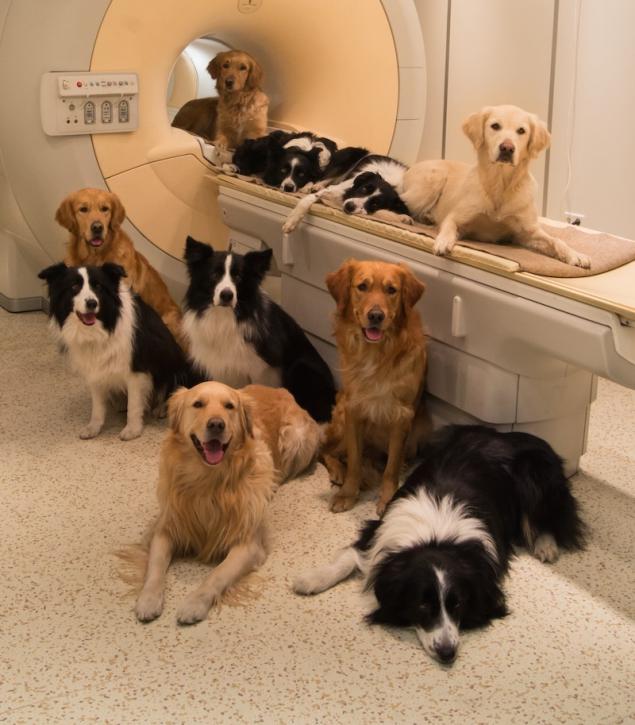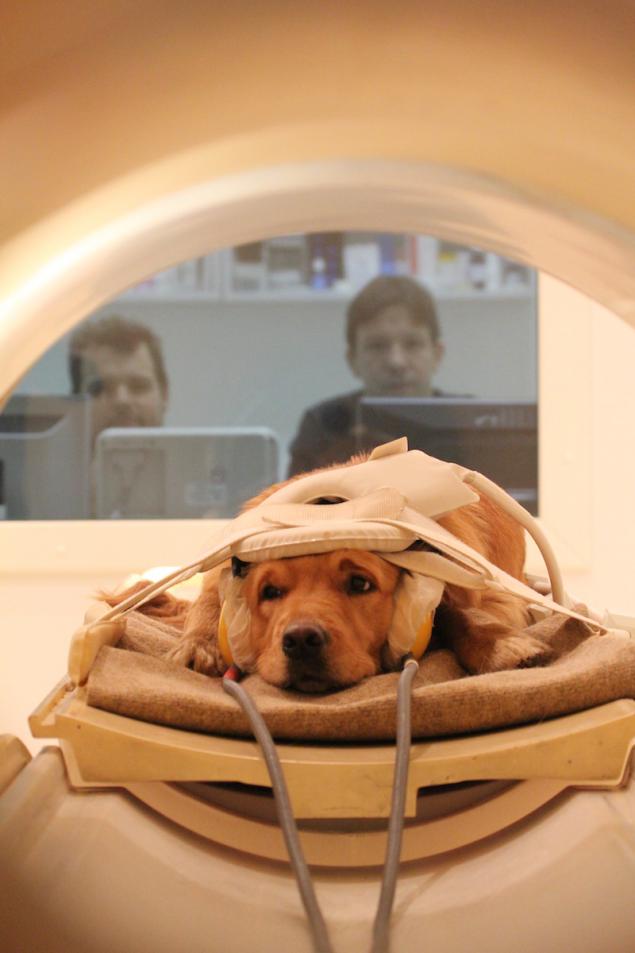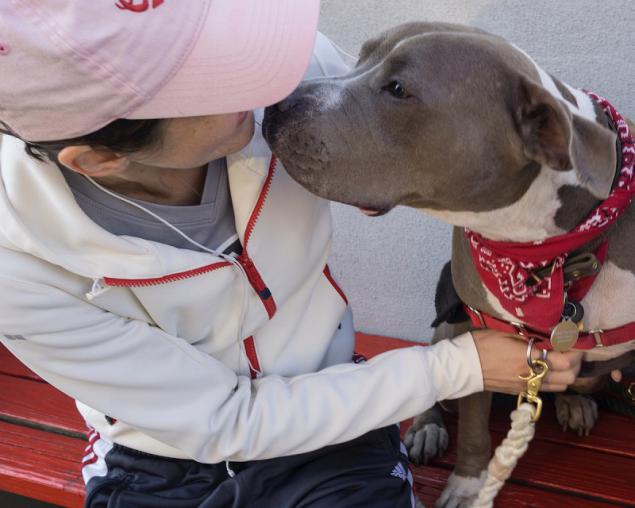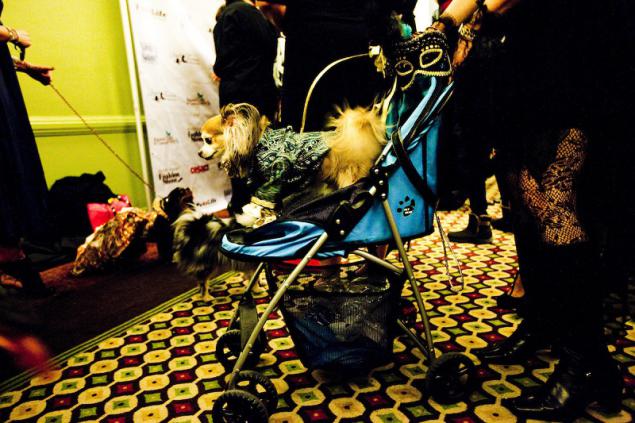Scientists examined the brain of dogs and know that they really think of us. An amazing discovery!
 Bashny.Net
Bashny.Net
For thousands of years, dogs have been friends of man. They look happy when we come home, play with us and seems to really like us. However, we can not be in this 100 percent sure as to read their thoughts, we do not know. Or is it still possible?
American scientists have begun research for canine brain and found that these animals not only love the owners, they also consider them my family. It turns out that dogs rely on us far more than we can imagine!

direct evidence that dogs are infinitely loyal to us, were the recent studies using neuroimaging canine brain. Scientists at Emory University (USA) makes the dog barking in the MRI machine and tried to share their neuronal processes in the perception of smells of people and dogs, friends and strangers. Since dogs experience the world through his nose, how they perceive smells is a wide field for the study.
Scientists found that the smell of the host causes the activation of "pleasure center of the brain" (lat. Caudate nucleus). Of all the penetrating odor priority for the dog it is just a human.
These results are linked to other neuroimaging studies of dog. Employees of the Budapest University of dogs studied brain activity in response to various sounds of other animals and people. It turned out that there are some similarities in how people react to the dog and emotionally charged vocal sounds.
Among other surprising discoveries - incredible similarities of how the dog and the human brain process emotions that you put in the words. In particular, in a happy tone sound highlighted the same parts of the cortex in both species. This community clearly indicates a strong communication link in a chain of "dog-people».
In short: the dog not only capture changes in our mood - they are physically set up to capture them.
«This is very interesting - to understand what makes a successful tool set two types of voice communication», i> - says Attila Andiks, neurologist and lead author of the study. «We do not need neuroimaging to see that communication (between man and dog) works, but without it we do not understand how it works. Now we have started ». I>
The dog waits scan Research Center in Budapest.

Behavioral studies confirm the results of neurological. Based Andiksa words, dogs interact with a human caregiver in the same way that children and their parents. When the dog is scared or worried, she runs to its owner, as well as children run to their parents. This contrasts sharply with the behavior of other pets, for example, the frightened horse or cat simply run away.
Dogs are also the only non-primate animals that may look a person in the eye. This is what Andiks found that about ten years ago, tried to domesticate wolves, which, in his view, also shared this trait dogs. He tried to grow wolves like dogs. This unique behavior of the dogs: they are looking for eye contact with people and wolves - no.

The relationship with the owners for dogs is much more important than for other pets. The researchers also looked at the relationship of man and dog on the other side. As it turned out, the human feelings of affection stronger dog. We measured the brain activity of people viewing photos of dogs and children. The subjects were women who have had dogs and children at least two years. Both types of pictures from activities in the areas of the brain responsible for feelings of reward, connection, visual processing, and social interaction. In principle, as fluffy and usually less furry family members make us happy about the same.
Dog lovers have made several notable gaffes in the interpretation of the expression dog muzzle for example, assuming that a sneaky look mean guilt. However, most researchers agree that it requires a multifaceted sense of self-awareness, which is likely to have a dog.
But, as in the case of the family, our guesses are often correct. «Sometimes our intuition about what happens in the mind of dogs work. How, for example, that dogs are waiting for help from us - and this is confirmed by studies - unlike its nearest relatives, the wolves », i> - says Laurie Santos, a leading researcher at the Center for the Study of dogs at Yale University.

What it wants a dog, she worries about what or what is behind her sad look - we do not always know for sure. But we can be sure that our pets love us as we are on the hope - and maybe even more. Even if they are not "full" children, they see us as a family. And we? Well, they will always be for us kids. Share these interesting studies with all sobakolyubami.
via ofigenno ru
American scientists have begun research for canine brain and found that these animals not only love the owners, they also consider them my family. It turns out that dogs rely on us far more than we can imagine!

direct evidence that dogs are infinitely loyal to us, were the recent studies using neuroimaging canine brain. Scientists at Emory University (USA) makes the dog barking in the MRI machine and tried to share their neuronal processes in the perception of smells of people and dogs, friends and strangers. Since dogs experience the world through his nose, how they perceive smells is a wide field for the study.
Scientists found that the smell of the host causes the activation of "pleasure center of the brain" (lat. Caudate nucleus). Of all the penetrating odor priority for the dog it is just a human.
These results are linked to other neuroimaging studies of dog. Employees of the Budapest University of dogs studied brain activity in response to various sounds of other animals and people. It turned out that there are some similarities in how people react to the dog and emotionally charged vocal sounds.
Among other surprising discoveries - incredible similarities of how the dog and the human brain process emotions that you put in the words. In particular, in a happy tone sound highlighted the same parts of the cortex in both species. This community clearly indicates a strong communication link in a chain of "dog-people».
In short: the dog not only capture changes in our mood - they are physically set up to capture them.
«This is very interesting - to understand what makes a successful tool set two types of voice communication», i> - says Attila Andiks, neurologist and lead author of the study. «We do not need neuroimaging to see that communication (between man and dog) works, but without it we do not understand how it works. Now we have started ». I>
The dog waits scan Research Center in Budapest.

Behavioral studies confirm the results of neurological. Based Andiksa words, dogs interact with a human caregiver in the same way that children and their parents. When the dog is scared or worried, she runs to its owner, as well as children run to their parents. This contrasts sharply with the behavior of other pets, for example, the frightened horse or cat simply run away.
Dogs are also the only non-primate animals that may look a person in the eye. This is what Andiks found that about ten years ago, tried to domesticate wolves, which, in his view, also shared this trait dogs. He tried to grow wolves like dogs. This unique behavior of the dogs: they are looking for eye contact with people and wolves - no.

The relationship with the owners for dogs is much more important than for other pets. The researchers also looked at the relationship of man and dog on the other side. As it turned out, the human feelings of affection stronger dog. We measured the brain activity of people viewing photos of dogs and children. The subjects were women who have had dogs and children at least two years. Both types of pictures from activities in the areas of the brain responsible for feelings of reward, connection, visual processing, and social interaction. In principle, as fluffy and usually less furry family members make us happy about the same.
Dog lovers have made several notable gaffes in the interpretation of the expression dog muzzle for example, assuming that a sneaky look mean guilt. However, most researchers agree that it requires a multifaceted sense of self-awareness, which is likely to have a dog.
But, as in the case of the family, our guesses are often correct. «Sometimes our intuition about what happens in the mind of dogs work. How, for example, that dogs are waiting for help from us - and this is confirmed by studies - unlike its nearest relatives, the wolves », i> - says Laurie Santos, a leading researcher at the Center for the Study of dogs at Yale University.

What it wants a dog, she worries about what or what is behind her sad look - we do not always know for sure. But we can be sure that our pets love us as we are on the hope - and maybe even more. Even if they are not "full" children, they see us as a family. And we? Well, they will always be for us kids. Share these interesting studies with all sobakolyubami.
via ofigenno ru
Tags
See also
Anonymous Confessions of a flight attendant: What They Really Think About
13 seats, which are more like a story than a reality. It's hard to believe that they exist!
Fish snacks native to China: what do we actually eat?!
Photographer from St. Petersburg, found out that women carry in their handbags
So what actually is? ..
Whether it really is the right education?
What we actually get by buying well-known products
How actually looked great people? An incredible discovery research.
9 stunned facts about space, we have learned this year
Fifteen of harmful products disguised as dietary food

















